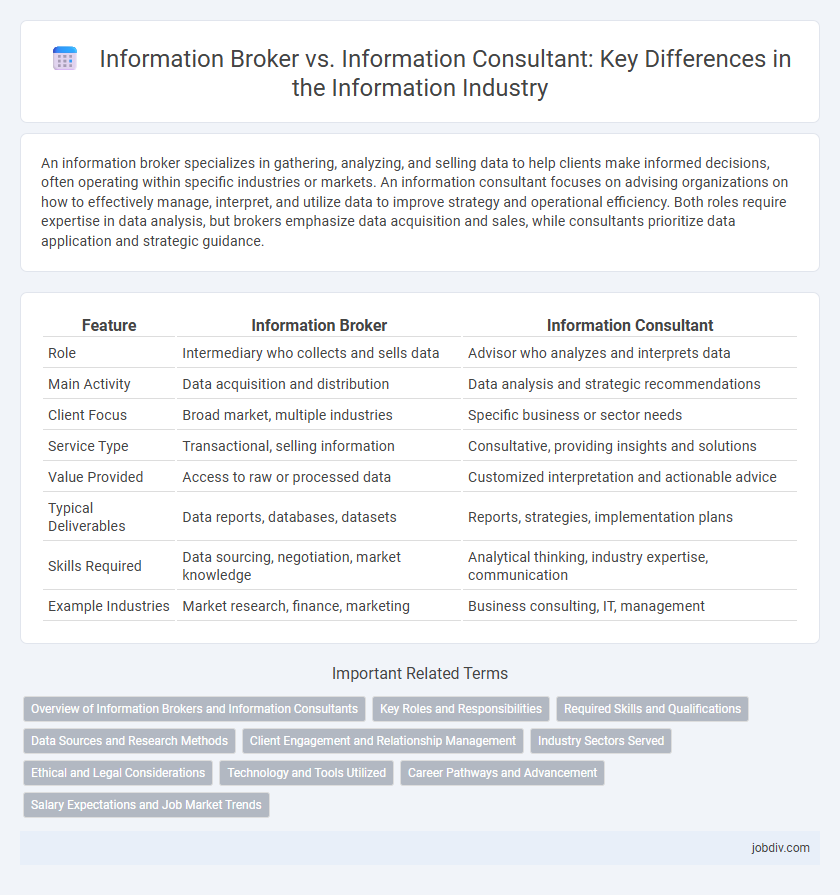An information broker specializes in gathering, analyzing, and selling data to help clients make informed decisions, often operating within specific industries or markets. An information consultant focuses on advising organizations on how to effectively manage, interpret, and utilize data to improve strategy and operational efficiency. Both roles require expertise in data analysis, but brokers emphasize data acquisition and sales, while consultants prioritize data application and strategic guidance.
Table of Comparison
| Feature | Information Broker | Information Consultant |
|---|---|---|
| Role | Intermediary who collects and sells data | Advisor who analyzes and interprets data |
| Main Activity | Data acquisition and distribution | Data analysis and strategic recommendations |
| Client Focus | Broad market, multiple industries | Specific business or sector needs |
| Service Type | Transactional, selling information | Consultative, providing insights and solutions |
| Value Provided | Access to raw or processed data | Customized interpretation and actionable advice |
| Typical Deliverables | Data reports, databases, datasets | Reports, strategies, implementation plans |
| Skills Required | Data sourcing, negotiation, market knowledge | Analytical thinking, industry expertise, communication |
| Example Industries | Market research, finance, marketing | Business consulting, IT, management |
Overview of Information Brokers and Information Consultants
Information brokers specialize in collecting, analyzing, and distributing data to support business decision-making, often utilizing proprietary databases and advanced data mining techniques. Information consultants provide expert advice on how to manage, interpret, and apply information effectively to improve organizational strategies and outcomes. Both roles play critical parts in transforming raw data into actionable insights, with brokers focusing on data acquisition and consultants emphasizing strategic application.
Key Roles and Responsibilities
An Information Broker specializes in gathering, analyzing, and selling data from diverse sources to support decision-making across industries, often focusing on market intelligence and competitive analysis. In contrast, an Information Consultant provides expert advice on managing, organizing, and leveraging information systems to improve business processes and optimize data usage. Key responsibilities for brokers include data acquisition and verification, while consultants emphasize strategy development, information architecture, and technology integration.
Required Skills and Qualifications
Information brokers require strong research skills, expertise in data analysis, and proficiency in sourcing credible information from diverse channels. Information consultants need advanced knowledge in industry-specific domains, excellent communication abilities, and consulting experience to provide strategic insights and actionable recommendations. Both roles demand critical thinking, attention to detail, and the capability to interpret complex data accurately.
Data Sources and Research Methods
Information brokers specialize in aggregating and selling data from diverse public and private databases, employing advanced data mining and automated scraping techniques to ensure comprehensive coverage. Information consultants focus on tailored research strategies, utilizing qualitative and quantitative methods such as interviews, surveys, and expert analysis to provide actionable insights. Both rely on credible sources, but brokers emphasize breadth and speed, while consultants prioritize depth and customization in data interpretation.
Client Engagement and Relationship Management
Information brokers specialize in gathering and providing data tailored to client needs, emphasizing data accuracy and efficient delivery to support decision-making processes. Information consultants engage deeply with clients to analyze their information challenges, offering strategic advice and customized solutions to improve organizational knowledge management. Strong relationship management in both roles ensures ongoing client trust and adaptability to evolving information requirements.
Industry Sectors Served
Information brokers primarily serve the financial, legal, and healthcare sectors by providing specialized data acquisition and verification services. Information consultants target diverse industries such as technology, marketing, and manufacturing, offering strategic insights and data-driven decision support. Both roles leverage tailored information solutions but differ in industry focus and the scope of services provided.
Ethical and Legal Considerations
Information brokers collect, aggregate, and sell data, often raising concerns about privacy violations and compliance with data protection laws like GDPR and CCPA. Information consultants provide strategic advice on data use and management while adhering to ethical standards that promote transparency, consent, and data accuracy. Both roles require strict adherence to legal frameworks to avoid unauthorized data sharing and ensure responsible information handling.
Technology and Tools Utilized
Information brokers leverage advanced data mining software, artificial intelligence algorithms, and extensive databases to collect, analyze, and sell data across various industries. Information consultants utilize strategic analytics platforms, customized reporting tools, and knowledge management systems to advise organizations on optimizing information flow and decision-making processes. Both roles emphasize the integration of big data technologies and cloud-based solutions to enhance data accessibility and accuracy.
Career Pathways and Advancement
Information brokers collect, analyze, and sell data to organizations seeking competitive intelligence, often advancing by specializing in niche industries or developing proprietary databases. Information consultants provide strategic advice on data management and utilization, with career growth tied to expanding expertise in emerging technologies and consulting methodologies. Both career paths offer progression through certifications, client portfolio expansion, and leadership roles in data-driven decision-making sectors.
Salary Expectations and Job Market Trends
Information brokers typically earn between $50,000 and $90,000 annually, with job market demand growing steadily due to increasing reliance on data aggregation and market intelligence. Information consultants often command higher salaries, ranging from $70,000 to $120,000, driven by specialized expertise in data analysis and strategic information management. Current job trends indicate a rising need for both roles as businesses prioritize informed decision-making powered by accurate and timely data insights.
Information Broker vs Information Consultant Infographic

 jobdiv.com
jobdiv.com